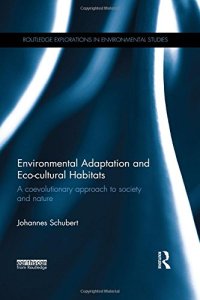
Ebook: Environmental Adaptation and Eco-cultural Habitats: A coevolutionary approach to society and nature
Author: Johannes Schubert
- Tags: Environmental Economics Business Money Evolution Fossils Game Theory Genetics Molecular Biology Organic Paleontology Science Math Environmentalism Environment Human Geography Social Sciences Politics Sociology Abuse Class Death Marriage Family Medicine Race Relations Rural Urban New Used Rental Textbooks Specialty Boutique
- Series: Routledge Explorations in Environmental Studies
- Year: 2015
- Publisher: Routledge
- Language: English
- pdf
In this challenging and highly original book, the author tackles the dynamic relationships between physical nature and societies over time. It is argued that within each eco-cultural habitat, the relationship between physical nature and society is mediated by specific entanglements between technologies, institutions, and cultural values. These habitat-specific entanglements are neither ecologically nor culturally predetermined, but result from mutual adaptation based on variation (trial and error) and selection. It is shown how a variety of eco-cultural habitats evolves from this coevolutionary process. The book explores how these varieties come into being and how their specific characteristics affect the capacity to cope with environmental or social problems such as flooding or unemployment.
There are two case studies illustrating the potential of a coevolutionary understanding of the society-nature nexus. In the first, rural and urban settlement structures are conceptualized as distinct paths of eco-cultural adaptation. It is shown that each of these paths is characterized by predictable spatial correspondences between dwelling technologies, modes of social reproduction, cultural preferences, and related patterns in energy consumption (i.e. social metabolism). The second case study deals with flood protection in liberal and coordinated eco, welfare, and production regimes, drawing on lessons from the Netherlands and Hurricane Katrina in New Orleans. As a contribution to theory in environmental sociology, the coevolutionary perspective developed provides deeper insights into the intricate interplay between physical and social nature.